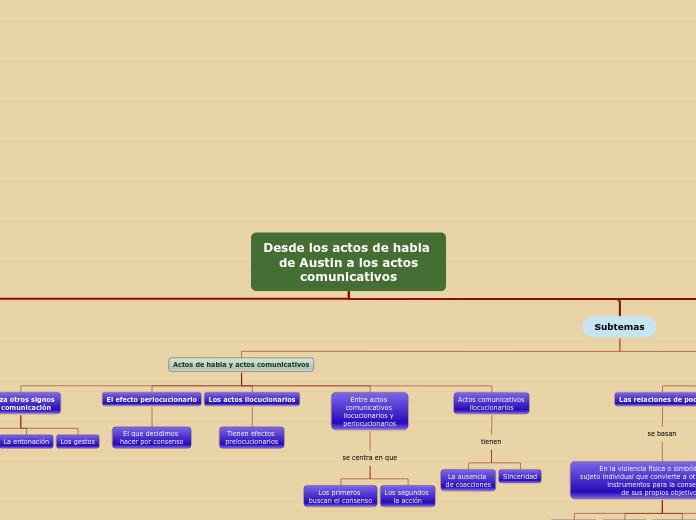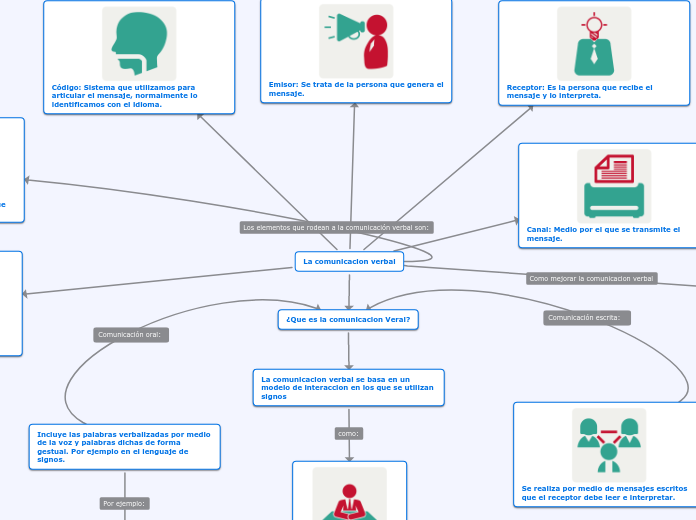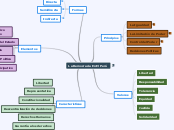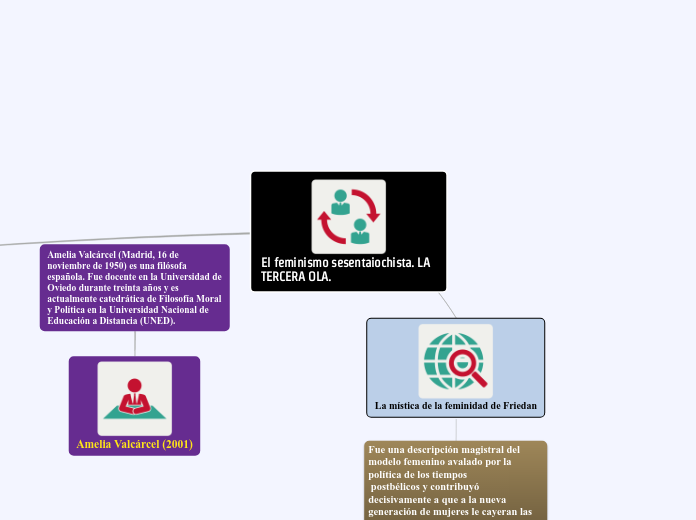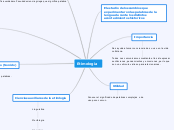Desde los actos de habla de Austin a los actos
comunicativos
To name your story, you have to think about the overall message and what you want your audience to understand from the story. Also, make it relevant and easy to remember.
Conclusión
La intersección entre actos comunicativos ilocucionarios y perlocucionarios
Nos aporta elementos imprescindibles
para poder distinguir, en el marco de sociedades plurales, complejas y cambiantes.
se generan dentro
Actos comunicativos
Poder
Intencionalidad del hablante y/o de las desigualdades de la estructura social.
Actos comunicativos perlocucionarios (orientados a la consecución de una acción)
Dialógicos
Interacciones dialógicas (ausencia de coacciones)
Actos comunicativos ilocucionarios (sinceridad)
Subtemas
Relaciones de poder y relaciones dialógicas
Las relaciones dialógicas
La comunicación que lleva a todos los sujetos implicados a compartir una acción, acuerdo, sentimiento o deseo.
Concepto de validez
ligado
Teoría de la argumentación
privilegia
Dimensión dionisíaca de la realidad humanada
(deseo, emoción, sentimiento)
Para ser racionales de debe reprimir la D.D.
Dimesión appolínea
(palabra,razón, argumento)
Reduccionismo apolíneo
facilita
La represión u olvido de la dimensión dionisiaca
La democracia
Las relaciones sexuales
Las relaciones de poder
se basan
En la violencia física o simbólica de un
sujeto individual que convierte a otros sujetos en instrumentos para la consecución
de sus propios objetivos.
El acaso sexual
La manipulación
La violación
La dictadura
Actos de habla y actos comunicativos
Actos comunicativos ilocucionarios
tienen
Sinceridad
La ausencia de coacciones
Entre actos comunicativos ilocucionarios y perlocucionarios
se centra en que
Los segundos la acción
Los primeros buscan el consenso
Los actos ilocucionarios
Tienen efectos prelocucionarios
El efecto perlocucionario
El que decidimos hacer por consenso
Utiliza otros signos de comunicación
Los gestos
La entonación
El lenguaje del cuerpo
Introducción
In the beginning of the story (or the exposition), you will need to introduce the setting and characters. You might also want to introduce the main conflict. This part of the story is important because it gives the reader necessary background information and maybe even a first insight into a character’s personality.
Austin (1962) desarrolla la pragmática linguística con sus conceptos de actos de habla locucionarios, ilocucionarios y perlocucionarios.
The setting (time & place) of a story can change throughout the plot.
Habermas (1987) comprende mal a Searle sobre la diferencia entre ilocucionario y perlocucionario.
Searle (1969) rechaza la distinción de Austin
The time of the story can also change. It can describe the event of a single day or can include an entire year's plot. Anyway, don't forget to mention it.
Todos los actos son ilocucionarios.
This is the moment when the main character surpasses the last obstacle and finally faces their greatest challenge.
The climax usually follows one of these patterns:
- realization
- resolution
- choice
Type in your answer.
Toda emisión contiene un indicador de su fuerza ilocucionaria como parte de su significado.
The ending of a story is essential. We all know that if the ending is weak, what happened before loses its importance. So make it unpredictable, but fair. A resolved ending answers all the questions and ties up any loose threads from the plot.
Emisiones con el mismo significado
Your story can take place wherever your imagination will take you to.
For example: in an elevator, in an enchanted forest, etc. Don't forget to give details of the environment each time the setting changes, otherwise, the story can be confusing. Also, mention the seasons as each of them has unique weather and events.
"¡Vamos a evitar la matriculación de mas inmigrantes!"
Es un acto ilocucionario por tener también fuerza ilocucionaria
"En este centro van a evitar la matriculación de más inmigrantes"
La filosofía del lenguaje
Las palabras juegan un papel trascendental
La propia construcción de la realidad social
La comunicación
Contribuciones
a ese diálogo igualitario
Habermas (1987) tomó ambas como base dialógica de su
teoría de la acción comunicativa.
Austin (1962) en torno
a los actos de habla.
Searle (1969) continuó la obra de su maestro Austin.
Se celebró una jornada en el Edificio Alterio Spinelli del Parlamento Europeo (18/11/2009).
Characters are essential to a good story. Usually, the protagonist(s) is/are the most affected by the plot. Introduce a character by focusing on their actions, interests, and occupation, as the physical appearance doesn't make a difference in most cases.
Contaron con diversos ponentes
Type in the name of your character.
Miembros de grupos culturales de barrios desfavorecidos
Add other properties of the character.
Profesores
Add other qualities/attributes of the character.
Madres
What is your character's main goal?
fight Evilfind lovedefeat his/her enemyrule the worldmake friendstime travelmake an awesome discoveryOther
Investigadores
Which traits best describe the character's personality? Choose more if necessary:
introvertedloyalkindindependentquick-thinkingadventuresomeidealisticsweet-naturedcalmrisk-takercreativewittystrictfussyweirdclumsyharshaggressivecarelessclingingcowardlycrueldeceitfulimpulsiveOther
Parlamentarias
Choose the type of your chacter:
Protagonist (main character)Antagonist (main character's opponent)Flat (stereotypical character)Round (his/ her personality develops throughout the story)Static (doesn't evolve as a person throughout the story)Dynamic (dramatical change in personality)Confidant (the main character trusts him/ her)Foil (contrasting character who enhances the personality of another character)Other
